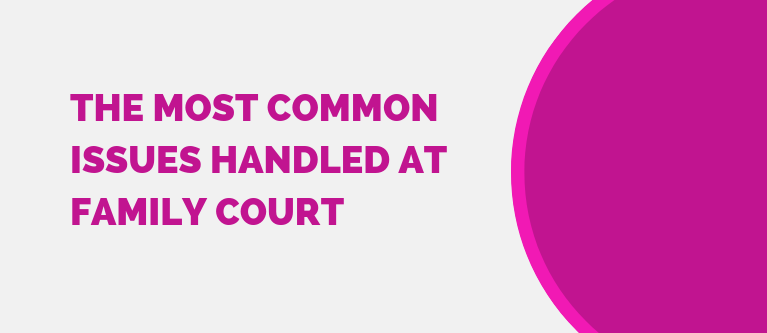The prospect of attending family court may be a scary one, but you can rest assured that the legal officials who preside over the processes of Family Law are experienced specialists with the best interests of both yourself and your family at heart. Going to court over a particular issue will mean that you are bringing your problems before experts who are highly trained to help you solve them. Family court exists to help bring a satisfactory end to disputes involving members or ex-members of the same family. Here are a few of the issues that are most commonly brought before a family court.
What Happens to Children After Their Parents or Guardians Separate or Divorce?
Matters involving children are regularly handled in family court. If a child’s guardians are struggling to agree on where the young person will live once the household is divided, court officials will ensure that a suitable decision is made. These kinds of matters are known as Child Arrangements.
Within the same field, there exists the issue of Child Maintenance. This involves the court discerning how a child will be financially supported if the parents or guardians have separated. Depending on earnings, one may be required to provide more support than the other in the raising of young family members.
Family court matters involving children don’t stop there. There are also Specific Issue Orders – another approach that may need to be taken after a family is divided by divorce or separation. This can be required if parents, guardians or people with parental responsibility cannot come to a decision regarding certain matters – such as what a child’s surname will be after the split.
The final common family court issue involving children is the Prohibited Steps Order. This refers to a particular individual, who has parental responsibility for a child, being ordered to abstain from taking certain actions – such as, removing the child from the country.
What Happens to Finances and Property After a Separation or Divorce?
Couples can also attend family court in order to have a decision made regarding their money and belongings. After years together, it’s often difficult to decide what belongs to whom, and this can cause serious disputes that are difficult to solve when a relationship breaks down.
A Maintenance Order may be required if one member of the couple that is parting ways, believes that they are owed an amount of financial maintenance from their ex-partner, and the court concurs with their argument. The amount to be paid will be calculated by specialists according to the earnings and relevant expenses of the couple.
If, before the divorce or separation, the intention was originally for both parties within a couple to receive a share of one pension pot, the court can also issue a Pension Sharing Order to ensure that the amount will still be divided between them fairly.
What if a Family Member Feels as Though They Are Being Forced Out or Intimidated?
Both Occupation Orders and Non-Molestation Orders can be put in place to assist victims of domestic abuse and domestic violence. These orders help them to remain safe in their home, without the threat of harassment or mistreatment at the hands of another family member or resident of the property, and without being forced out to live elsewhere.
Should I Take My Case to Family Court?
If you are having difficulties making decisions or you and other members of your family are having disputes or arguments as a result of a change of circumstances, it may be worth contacting the family court to see what can be done. However, before you do so, it is extremely important that you consult a solicitor that specialises in Family Law. This specialist will help you to put together all the facts in a way that will help court officials to come to an agreement that is fair and just, for you and your family members, and they will also be able to represent you in a courtroom.
Why Us?
St Helens Law is a dedicated solicitors firm specialising in Family Law. Their legal experts can look back over almost twenty years of successful practice within this field and will fight to ensure that all decisions made on behalf of you and your family are the right ones. If you contact us today, we can offer you a free consultation during which we will discuss all relevant matters of Family Law with you and help you to decide on the correct course of action for your particular circumstances. We’ll be by your side every step of the way. Call us on 01744 385171.


